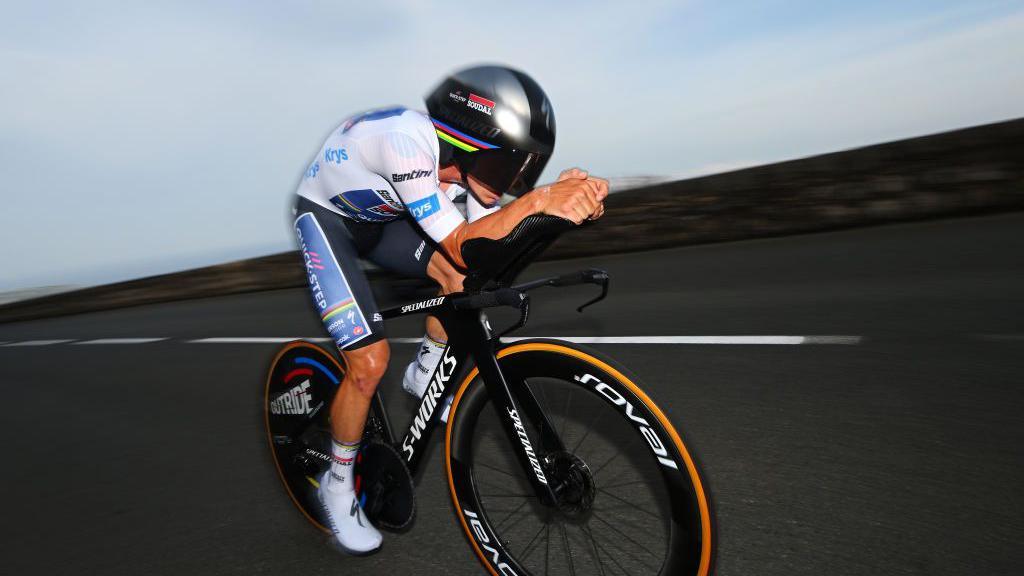What do the different colour jerseys mean at Tour de France?
- Published
There are four different jerseys used to differentiate the classifications at the Tour de France.
These are yellow, green, polka-dot and white and are handed out at the end of each stage with the leader in each category wearing it during the next stage.
Riders will battle it out for the respected jerseys over 21 stages, involving a mix of flat, hilly and mountain stages, across a distance of 3,338.8 km.
Get in touch
Send us your questions

Tadej Pogacar was the fastest rider at the 2024 Tour de France and won the yellow jersey
Yellow jersey
The yellow jersey (maillot jaune in French) is worn by the leader of the general classification - the rider who has taken the lowest accumulated time over the course of the race.
Yellow was chosen for the jersey because the race's original organiser, French newspaper 'L'Auto', was printed on yellow paper.
The race leader is presented with the yellow jersey at the end of each stage and will wear it the following day.
Tom Simpson was the first British rider to wear the yellow jersey, having moved into the overall lead of the 1962 race after stage 12.
British riders won six out of seven yellow jerseys, with Sir Bradley Wiggins the first in 2012. Chris Froome won four titles (2013, 2015, 2016 and 2017) while Geraint Thomas won the yellow jersey in 2018.
Four riders have won a joint record five Tours de France: Jacques Anquetil and Bernard Hinault of France, Belgium's Eddy Merckx and Miguel Indurain of Spain.
In 2024, Slovenia's Tadej Pogacar won his third title, finishing the race, six minutes clear of second place Jonas Vingegaard.

Biniam Girmay won the green jersey in 2024
Green jersey
The green jersey (maillot vert in French) represents the points classification.
It is handed to the rider with the most points at the end of each stage and overall at the end of the tour.
This jersey, which was created for the tour's 50th anniversary in 1953, is often considered the sprinters' jersey.
Points are awarded for the top 15 finishers on flat, medium mountain, high mountain and individual time trial stages.
There are also points available in an intermediate sprint on each stage - this is a specific point of the route where riders will sprint for additional points.
The most points are awarded at the finish of flat stages, with 50 points for the first over the line.
Points can be lost for dangerous sprinting, irregular conduct and violating rules.
Slovakia's Peter Sagan won a record seven titles between 2012 and 2019, while Britain's Mark Cavendish claimed the green jersey in 2011 and 2021.
Eritrean rider Biniam Girmay made history in 2024 by becoming the first black African winner of the Tour de France points classification.

Richard Carapaz was awarded the 2024 polka-dot jersey
Polka-dot jersey
The polka-dot jersey (maillot à pois rouges in French) is awarded to the rider who collects the most points to lead the mountains classification.
The rider who wears this white jersey with red polka dots is referred to as the 'King of the Mountains'.
Each climb is categorised from one, most difficult to four, least difficult - the tougher the climb, the more points are available.
There is also a fifth category which is reserved for the most challenging climbs, known as 'hors categorie' and are typically the big mountain ascents.
Organisers of the event decide which climbs will be included and what category of difficulty they will fall into.
The King of the Mountains classification has been won a record seven times by Richard Virenque of France and was claimed by Ecuador's Richard Carapaz in 2024.

Belgium's Remco Evenepoel won the white jersey in 2024
White jersey
The white jersey (maillot blanc in French) is awarded to the fastest young rider and was first introduced in 1975.
The riders in with a chance of winning this jersey must be 26 years old or younger.
It has been won twice by British riders, twins Adam and Simon Yates, who won in 2016 and 2017 respectively.
Remco Evenepoel won the white jersey at last year's tour.
This article is the latest from BBC Sport's Ask Me Anything team.
What is Ask Me Anything?
Ask Me Anything is a service dedicated to answering your questions.
We want to reward your time by telling you things you do not know and reminding you of things you do.
The team will find out everything you need to know and be able to call upon a network of contacts including our experts and pundits.
We will be answering your questions from the heart of the BBC Sport newsroom, and going behind the scenes at some of the world's biggest sporting events.
Our coverage will span the BBC Sport website, app, social media and YouTube accounts, plus BBC TV and radio.